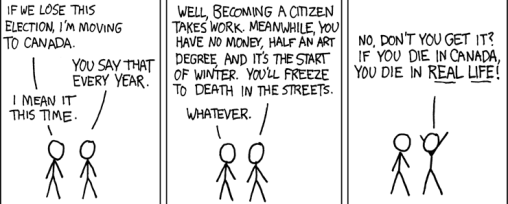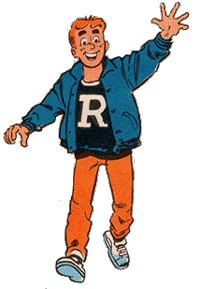From today, just as an experiment, I’m going to recommend something every day to you. It could be a book I’ve read, a film I’ve seen, a song I like, whatever. Be warned, this is a provisional post.
Why am I doing this? As I said, as an experiment. It came to me while I was watching Chuckleball Jailhouse Jocks a couple of days ago, when they did a skit of Tiger Woods, calling him “the most endorsed man in history”.
I found the whole concept of endorsements insane. First, you’re expected to take advice from someone you don’t know; then, you’re expected to take that advice on subjects that person is not necessarily knowledgeable about; and finally, you’re expected not to care that the person is being paid a gazillion dollars to give that advice. Excuse me while I throw up.
The advice I am most interested in is impartial and independent and friendly. Which is what recommendations should be. So I thought to myself, how am I going to get recommendations? And the answer came: By giving them first. The next question was “Why should people bother?” And the answer came “They will, if they get value from the recommendations you make”. And the final question was “How can I be sure that the recommendations I get will be worthwhile?” And the answer came : “You can’t be sure, but you should expect some aspect of collaborative filtering to kick in”.
There are other things I want to learn about during the experiment, other questions I have kicking around my head.
One, since advertising is dying, just how will recommendations fill the gap? What can we learn from the way recommendations work, what will help us get VRM right?
Two, while we’ve seen how recommendations work in broadcast media and in Web 1.0, just how will recommendations work when there is no broadcast media? What does it mean to go to a truly P2P model for recommendations?
Three, both advertising and broadcast media go hand in hand with “hit cultures”. Recommendations and P2P models are much more “Long Tail” in their behaviour. [My thesis is that hit cultures were necessary because of the sheer wastage inherent in the traditional advertising-meets-broadcast-media business model. So much money was wasted in the grapeshot marketing and the layers of crap in the produce-to-consume chain, no one could afford to carry many lines as it were.]
Four, the Three Witches (Advertising, Broadcast Media and Hit Cultures) are not going to take change lying down. What will their response be? How will we know?
These are the sort of things I want to learn. This is how I will know whether my experiment was successful.
So. Step 1. Let me recommend something. Just because I like it. Preferably Long Tail and not Hit Culture. With reasons as to why I like it, and giving clues that will help you decide whether you might like it. And in most cases, they won’t be new stuff. They will form part of this Old Man’s River.
Recommendation 1. (Song)
Season of The Witch. Written by Donovan Leitch and performed by Michael Bloomfield, Al Kooper and Stephen Stills, available on Super Session. A fantastic song on a fantastic album. You can listen to song samples and even order the album if you want via this link. [And no, I do not have an affiliate program with Amazon, not my style. Not unless they allowed me to point the affiliate earnings directly to a charity of my choosing.]
Why do I like it? It has this folk-rock meets hard-rock feel to it, strong bass lines, a syncopated beat. You can actually hear the words they’re saying, and the words make sense when strung together. It’s written by someone who could sing and play, not just write. It’s sung by people who care about what they do, talented musicians who saw what they did as a vocation, a calling, and not just a way of making money. It’s recorded by people who saw that as a vocation as well. It was done as part of a single long recording session, none of the pampering that goes on today.
All of these things are actually trivial when you consider the real reason. It’s a bloody good song performed by great musicians.
So, if you haven’t heard it yet, find a way. And let me know what you think. I will move on to recommendation 2 tomorrow, and try and keep things going until the experiment is successful.





